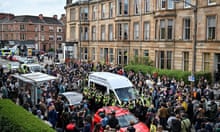When Gabriel Vest ran into Asda on Sunday evening with £300 to spend on underwear and socks, staff at Glasgow’s southside branch were initially bemused. He explained he was buying emergency supplies for around 90 asylum seekers evacuated from the Park Inn hotel last Friday after Badreddin Abedlla Adam, from Sudan, stabbed six people before being shot dead by police. “Then they just wanted to help. I didn’t even have to queue.”
Vest, who ordinarily works with Bikes for Refugees, was bulk-buying for Maslow’s, a nearby community shop that supplies second-hand clothing for newly arrived migrants, and that day was hurriedly putting together packages for residents who had had to leave their belongings behind the police cordon. “I got a message from another volunteer who was at the hotel, to say there was one man who was still in his underwear because that was how he’d left his room when the fire alarm had gone off. He was left like that for two days. It was grim.”
In the week since the tragic events at the Park Inn, a network of grassroots groups has galvanised with extraordinary care and efficiency, coordinating the wider public’s desire to help, and reinforcing the council slogan that People Make Glasgow. But they are also mindful of sanitising their argument that, by feeding and clothing the hotel residents as they have done throughout the pandemic, charities and citizens are doing a job the authorities have failed at.
On Monday morning, D, one of 370 asylum seekers moved into city centre hotels at the start of lockdown by the Home Office’s private housing provider Mears, arrived at the Govan base of the Unity Centre. The migrants’ support collective had posted an online appeal for donations for those displaced from the Park Inn and watched in awe as it was shared hundreds of times.
That morning, the centre was overwhelmed with visitors from across Glasgow dropping off bags of clothing, toiletries, phones and chargers which spilled out on to the pavement. “We opened at 10am and by 10.30 there was too much,” D explains. “It touched my heart.”
D is still resident at McLay’s guest house, where Adnan Olbeh, a Syrian man, was found dead in May, having previously expressed suicidal thoughts. His death, and allegations that he did not get the psychological support he needed, claims denied by Mears, redoubled the efforts of campaigns such as the No Evictions Network, which originally formed in in 2018 in response to the widely condemned lock-change policy of Serco, the previous Home Office housing provider.
A week on, the groups involved in this long fight to be heard – mainly led by volunteers and migrants, juggling day jobs and spreadsheets that log a request for shoes or how recently an individual has received a check-in call – are exhausted.
They underline that the ongoing needs of former Park Inn residents are psychological as much as practical. “They are still in a state of shock,” explains the Kurdish community activist Ako Zada. “There was no briefing and with no translators it took time for people to understand the basic facts about what happened on Friday. People are worried that it’s going to happen again, and spending time outside because they feel unsafe in their rooms.”
It’s a description echoed by the migrant-led support group MORE, which has been distributing mobile top-up vouchers. Despite assurances from Mears and the Home Office, outreach worker Eve says: “We’ve been told repeatedly about the lack of trauma support. People have had panic attacks and flashbacks, and are having to wait four days to get access to headache medication.”
In parallel with this ongoing support, the past week has added urgency to demands for wider changes to the asylum system. With piles of donations still to sort through, Annie Tothill, a Unity Centre member, observes: “If every person who dropped off a bag could write to their MP or the Home Office then maybe that would lead to system change rather than continuous firefighting.”

At a protest outside the Home Office’s Glasgow base on Wednesday evening, a sizeable crowd stood in the unseasonably chill wind, reflecting on a week of shock, sadness and anger. It was organised by Positive Action in Housing, whose director Robina Qureshi reiterated her call for an independent investigation into the treatment of asylum seekers in Glasgow during lockdown, as well as the restoration of their financial support and residential accommodation.
These aims are shared by the Refugees for Justice campaign , launched earlier this week, which stresses that the voices of those in hotels must be heard fully in any inquiry.
Co-founder Dylan Fotoohi says: “It’s not a new story that the asylum system doesn’t treat people with dignity or justice, but in this instance the consequences of a broken system were a life lost, people injured and a city grieving. Glasgow didn’t sign up for this.”









